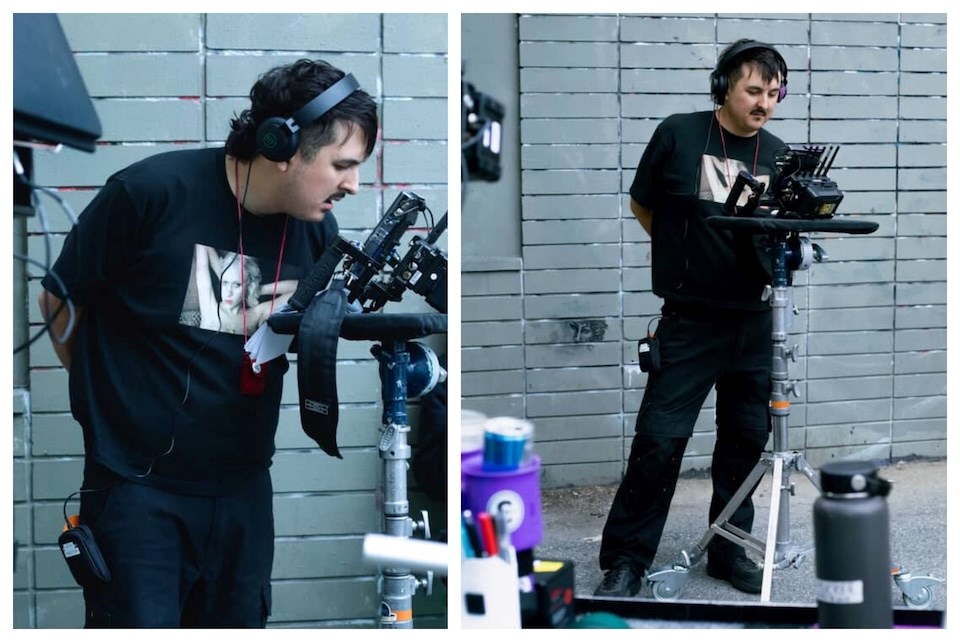"I wanted to make a film about contemporary Indigenous life for young queer people," says filmmaker Justin Ducharme.
He characterizes his latest project, Seventeen, as an ensemble film and a love letter to Â鶹´«Ã½Ó³»about the power of queer chosen family.
All three lead characters are sex workers, but the film isn't entirely about sex work. The entire film takes place over the course of seventeen hours.
"I think when people see the film, they're going to be very surprised," Ducharme tells V.I.A. "This script is really just trying to tell a story about the power of chosen family."
Seventeen features three main characters: December (played by newcomer Aalayna), her best friend Tamara (played by Nizhonniya Austin), and Aiden, a twenty-something gay man (played by Taio Gelinas), based loosely on Ducharme himself.
Many of the people whom the 30-year-old filmmaker considers part of this chosen family have lived experience as sex workers. However, he didn't want to make a film focusing solely on sex work, noting that he often felt "pigeon-holed" as a queer sex worker. Nuance and complexity are paramount to his storytelling.
"The film loosely embodies myself and my lived experience as a young, queer Native person moving to Â鶹´«Ã½Ó³»from a really rural environment and dealing with the complexities that come to city life," he explains. "As a storyteller, I like to make something that I feel fills a gap," adds the Seventeen writer and director.
"My intention with [this film] is this character study of people who also have intersecting identities of being queer, Indigenous, and sex workers."
"Â鶹´«Ã½Ó³»is a bit of a character in the film"
Ducharme says a scene from The Last Black Man in San Francisco struck a chord with him when a complaining to her friend about the city on a bus. He tells her, "You don't get to hate [San Francisco] unless you love it."
The filmmaker says the line points to the concept that someone can only criticize a place they truly understand and love.
Ducharme feels he is potentially critical of Â鶹´«Ã½Ó³»in his script, but also shows beauty that isn't often portrayed. This dichotomy bleeds from his personal experience living in the city.
"Â鶹´«Ã½Ó³»is a bit of a character in the film because I was really interested in the ways the city has been here for me and against me," he explains.
"I am alive. I am here. I am doing this story. I have been able to do this work because of the love and support of sex workers and of people who have supported me when I was really young and doing things to survive."
On one hand, the friends he's made in his community "kept him alive for over a decade." But at the same time, the filmmaker says, "Â鶹´«Ã½Ó³»is pretty racist toward Indigenous people," adding that he sees a great deal of "virtue signalling about how Native people are treated within the Â鶹´«Ã½Ó³»context."
A story several years in the making
Ducharme originally wrote the script for Seventeen in 2018 but says it "really took shape" after he participated in an Institute screenwriting lab intensive in 2019/2020. Initially, he took the course to hone his craft but wasn't sure he would make the script into a feature.
He spent over two-and-a-half years after writing the script consulting with his community and organizations such as PACE, a peer-driven society that seeks to reduce harm to sex workers through education, outreach, and support.
The filmmaker also edited Hustling Verse: An Anthology of Sex Workers' Poetry, including 50 stories from voices around the world of people with lived sex work experience. He knows the importance of representation, and of not only telling one story.
"This isn't a film about sex workers doing sex work. This is a film about sex workers existing over a very short period of time, and they are fully realized human beings," he says.
"They have problems, interests, lives, and things outside of their jobs that make them human. And that's what I wanted to capture."
Seventeen is currently filming in Â鶹´«Ã½Ó³»and is expected to be released in 2026.



